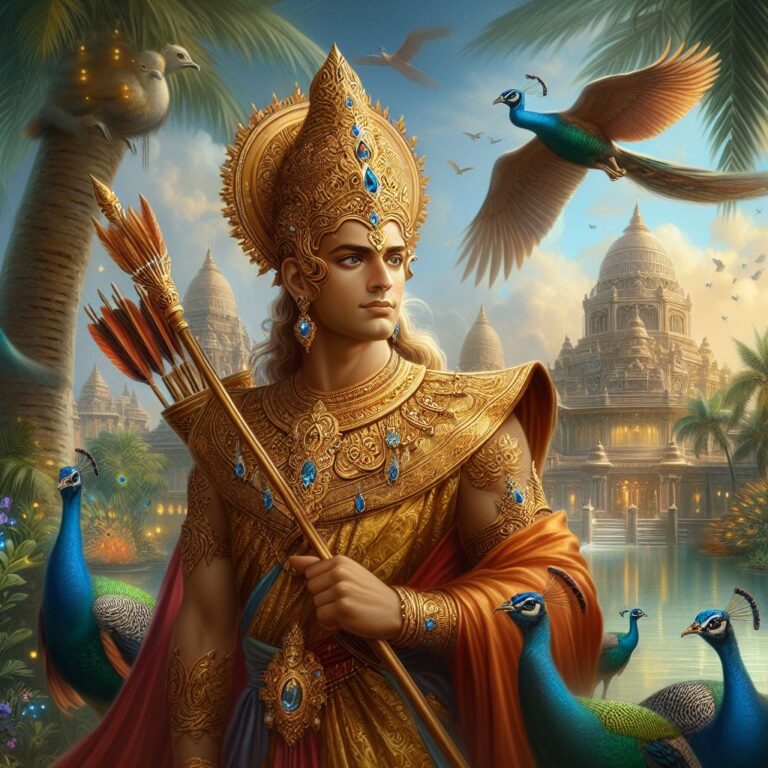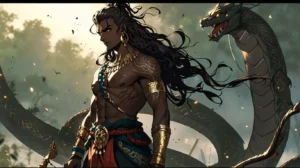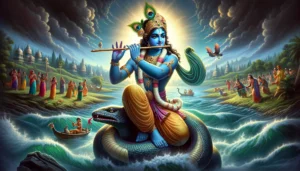In the vast tapestry of Indian mythology and literature, the Mahabharata stands as an epic masterpiece, weaving together intricate narratives of valor, treachery, and redemption. Among its many characters, Yudhishthira shines as a paragon of righteousness and virtue. His journey, marked by trials and moral dilemmas, encapsulates the complexities of human nature and the eternal struggle between dharma (duty) and adharma (vice). Yudhishthira’s life and character offer timeless lessons in integrity, resilience, and moral fortitude, resonating across cultures and generations.
Early Life and Lineage
Yudhishthira, also known as Dharmaraja, was the eldest son of King Pandu and Queen Kunti. Born to Kunti through the divine boon granted by sage Durvasa, Yudhishthira was the rightful heir to the throne of Hastinapura. His lineage traced back to the illustrious Bharata dynasty, renowned for its valor and nobility. Raised alongside his four brothers—Bhima, Arjuna, Nakula, and Sahadeva—in the Kuru dynasty, under the care of their mother and uncle, Vidura, Yudhishthira imbibed the principles of duty, honor, and righteousness from a young age.
“Even as I am known, O scorcher of foes, by the name of Yudhishthira, so was I in the past known among men by the name of Ajatashatru.” – Yudhishthira (Mahabharata)
Traits and Attributes
Yudhishthira was characterized by his unwavering adherence to dharma, regardless of the challenges he faced. His humility, integrity, and wisdom earned him the respect of both allies and adversaries alike. Despite possessing the skills of a formidable warrior, Yudhishthira’s true strength lay in his moral compass and his ability to navigate the complexities of ethical dilemmas with grace and poise. His unwavering commitment to righteousness served as a guiding light for his brothers and companions throughout their tumultuous journey.
“Righteousness is the essence of life, and it should be embraced even in the face of adversity.” – Yudhishthira (Mahabharata)
Trials and Tribulations
The Mahabharata recounts Yudhishthira’s journey through numerous trials and tribulations, each testing his resolve and commitment to righteousness. From the exile in the forest to the deceitful game of dice orchestrated by Shakuni, Yudhishthira faced adversity with resilience and equanimity. His unwavering faith in dharma guided him through the darkest moments, serving as a beacon of hope for his brothers and allies amidst the storm of betrayal and treachery that engulfed them.
“The path of righteousness may be fraught with obstacles, but it is the only path worth treading.” – Yudhishthira (Mahabharata)
The Great War
Yudhishthira’s role in the Kurukshetra War, the epic climax of the Mahabharata, was pivotal. Despite his aversion to bloodshed, he recognized the inevitability of the conflict and assumed his duty as a warrior and leader. As the commander-in-chief of the Pandava army, Yudhishthira displayed strategic acumen and valor on the battlefield, upholding the cause of righteousness against the forces of adharma led by his cousins, the Kauravas. Despite the carnage and chaos that ensued, Yudhishthira remained steadfast in his commitment to dharma, leading his troops with courage and conviction.
“Our duty as warriors is not to seek victory at any cost, but to uphold the principles of righteousness and justice.” – Yudhishthira (Mahabharata)
Moral Dilemmas
Throughout the Mahabharata, Yudhishthira grappled with moral dilemmas that tested the very fabric of his character. One such instance was his decision to participate in the game of dice, which ultimately led to the Pandavas’ exile. Despite the unjust circumstances and the manipulations of their adversaries, Yudhishthira honored his word and upheld the principles of integrity and honor, even in the face of betrayal. His unwavering commitment to truth and righteousness, even in the face of personal sacrifice, exemplifies the moral complexity of his character.
“The path of righteousness is often fraught with sacrifice, but it is the only path that leads to true fulfillment.” – Yudhishthira (Mahabharata)
Aftermath and Ascension
Following the culmination of the war, Yudhishthira ascended the throne of Hastinapura as its rightful king. Despite emerging victorious, he was haunted by the moral cost of the war and the loss of countless lives, including those of his kin. His reign was marked by a commitment to justice, compassion, and reconciliation, as he sought to rebuild a fractured kingdom and usher in an era of peace and prosperity. Yudhishthira’s legacy endured long after his reign, serving as a testament to the enduring power of righteousness in the face of adversity.
“Our actions define our legacy, and it is our duty to leave behind a world that is better than we found it.” – Yudhishthira (Mahabharata)
The Legacy
Yudhishthira’s life exemplifies the timeless principles of integrity, resilience, and moral fortitude. His legacy endures as a beacon of hope and guidance, reminding us of the enduring power of righteousness in the face of adversity. In a world plagued by conflict and strife, Yudhishthira’s story serves as a timeless reminder of the importance of upholding the principles of dharma, even in the face of seemingly insurmountable odds. As we navigate the complexities of life, let us draw inspiration from Yudhishthira’s unwavering commitment to truth and righteousness, and strive to emulate his noble example in our own lives.


